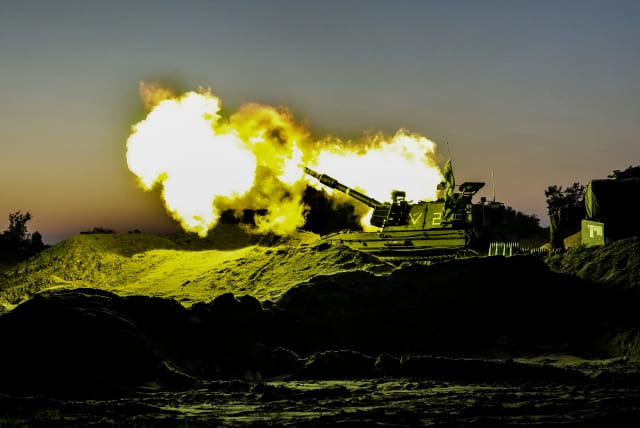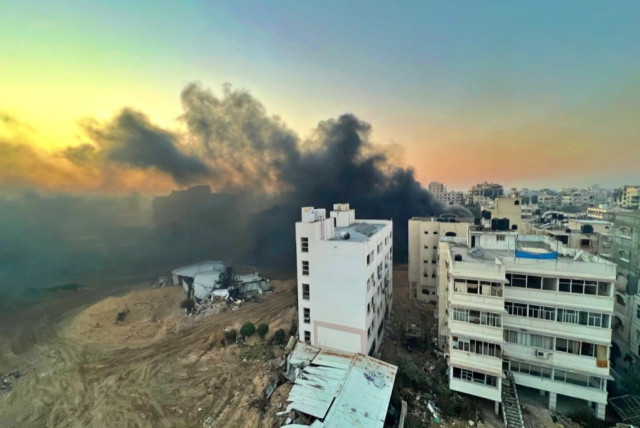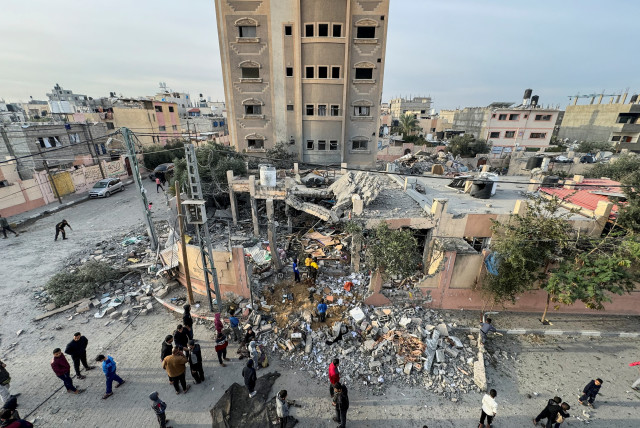

The IDF has seized control of a secret underground web of tunnels which both served as a bunker for the top Hamas leadership and as a transportation route to above-ground sites in and around Palestine Square in the Shuja’iyya neighborhood and in Gaza City itself.
“This is a city that exists on two levels, one above ground and one underneath,” Commander of the 401st Brigade, Major-General Beni Aharon told reporters, and the battle for it also takes place in both arenas.
Hamas leaders Ismail Haniyeh, Yahya Sinwar, Muhammad Deif used this network to manage the organization’s operation and movement through the heart of Gaza City, said the army, which has nicknamed the area “Commander’s Square.”
They could also travel around through the tunnels, hide for a prolonged period if needed, or escape, the army explained.
“Hamas took enough generators and solar panels from civilians so that they could survive down there for months and even weeks,” Aharon said.
The Square was located between a high-class residential area, that includes a college, a hotel, a school for the deaf, and a fancy bridal shop.

Deputy Commander of the 401st Brigade, Lt. Col. Ido, whose full name can’t be used said, “From outside everything looks normal, everything looks like a normal city.”
A short distance away from the two schools, but in the square itself, the IDF uncovered two tunnel shafts and a tunnel-making workshop, which they showed to reporters on Tuesday afternoon, but they did not take them into the tunnels themselves.
The IDF also released to the media videos detailing their find, with shots of the underground tunnels, including one that led from a home of Sinwar’s in the square, in which a spiral staircase could bring him directly down into a concrete corridor, complete with electricity.
The tunnels were discovered under property owned by Sinwar and Haniyeh, and allowed for Hamas leaders to travel from home to the office and to other places within the city, the army explained.
One office, now filled with debris, that the army showed reporters, is believed to have been used by Deif, with officers speculating that a wheelchair found in that room, could have been his.
The tunnels had electricity, water, phones, food, solar panels, security cameras, as well as rooms, including one that was 150 meters big. Arms were also found including rockets, RPGs and nighttime equipment.
An elevator was also found leading into a tunnel, used almost exclusively by Hamas leadership, the army explained.
Ido said that right off the square, which had been booby-trapped when they arrived. They also found a workshop for building tunnels.
“There are posters of instructions of how to build, when to do, what to do. You can see all around here cement and concrete and equipment for building the tunnel inside,” Ido said as he pointed to concrete slabs. “All these are the walls for the tunnel which are taken down with a high lift into the tunnels,” Ido said.
In the Square’s center had been a monument to Hamas’ successful attack against an IDF armored personnel carrier during the 2014 Gaza war, also known as Operation Protective Edge, in which seven soldiers were killed. This includes Oron Shaul, whose body has since been held by Hamas along with that of Hadar Goldin, also killed in that war.
It is also the place where some of the hostages were initially released, shots that were shown on Israeli television, in which the Square was filled with Palestinians.
Earlier this week, the IDF destroyed the monument.
The army seized the tunnels and the square thanks to the work of the 162nd Division’s 401st Brigade, which worked together with the Shaldag Unit and the 13th Squadron, which had also helped fight to secure the square from Hamas terrorists these last week, gaining almost complete control of it in the last few days.
The IDF estimates that it killed some 600 Hamas terrorists during that battle.
On Tuesday, when reporters arrived, the square was one large empty dustbowl of brown dirt, with a mound in the center.
On top of that mound was a flagpole, from which fluttered a large Israeli flag. Next to it was a large Hanukkah menorah, which was left standing, even though the holiday was last week.
“We arrived here before the first night of Hanukkah and in a tearful ceremony, we remembered those who had fallen and everything that we endured to get here and we lit the first candle,” Aharon said.
He added that he also loved the flag, which “has become a symbol of hope” and as “type of magic.”
Some of the buildings, such as the college and the school for the deaf were standing, but damaged, and others were reduced to rubble so that a ring of destruction also surrounded the square.
Reporters entered Gaza through a coastal road, first in a jeep, open in the back so that one could see how the road leading to Gaza City, and indeed every section of the city itself that reporters saw, had only destroyed, partially destroyed or damaged buildings.
At what soldiers called “the blue beach” which had been a resort, pagodas were partially destroyed and debris littered the sand.
From there they transferred to an armored vehicle with three soldiers at the helm, two of whom Elad and Deny explained how they had been in Gaza almost from the start, with little radio or telephone contact, including with their families.
One of them Elad, had a child’s drawing pasted to the top of the vehicle, with solider and blue stars next to it and the words “take care of yourselves” written out.
Elad said he received the picture in a care package and didn’t know who the child was, but he had placed it on top of the vehicle to remind him “why we are here and what we are fighting for.”
At the Square itself, much like the road leading up to it, there were no Palestinians in sight, and it seemed as if the city had become on strange ghost town, inhabited only by soldiers and journalists.
In one of the buildings journalists were taken into, soldiers had taken over apartments, which were still partially or livable. In one living room, they had placed mattresses on the floor. In another, they had set up a command center around a large fancy dining table, pasting a wall size Google type map on the wall, which they had found in a nearby office.
It was clear from the furniture and the tiles and hallway decor that the building had been modern, with expensive furniture, akin to what one could find in Tel Aviv or any other Middle Eastern city.
Aharon said that the terrain for the soldiers was no longer that of a civilian city, but one of combat.
During the time the group was there, three firefights broke out within a few block's radius, during which the IDF exploded the buildings, such that dust or flames and clouds of black smoke rose from them. Gun shoots and explosions could be heard in the distance.
Go to the full article >>Rocket sirens were heard in Misgav Am.
Rockets sirens were heard in Kfar Giladi, Kfar Yuval, Kiryat Shmona, Tel Hai, Ma'ayan Baruch, and Misgav Am.
Hezbollah said that it fired surface-to-air missiles at IDF helicopters near the Lebanese-Israeli border on Wednesday, with the IDF saying that intercepted one of them, as exchanges of fire between Israel and Hezbollah continued along the Lebanese-Israeli border. Additionally, several rockets were fired from Syria toward the Golan Heights on Wednesday evening.
Additionally, on Wednesday evening, four rockets were fired from Syrian territory toward the Golan Heights. The IDF struck the sites where the rockets were fired from, as well as a post belonging to the Syrian Army.
Go to the full article >>Defense Minister Yoav Gallant on Wednesday got closer to the Houthis than usual on a naval vessel near Eilat threatening the Yemen terror group if they dare to continue to try to attack Israel’s southernmost city.
“We will not tolerate threats and attempts to harm Eilat, the navy and the air force are ready for any order,” he said standing on the IDF navy Sa’ar 6 Magen vessel which is part of the area’s defense.
The Houthis have attempted dozens of attacks over the course of the war using ballistic missiles, drones, and other means, but have achieved little to date.
This has led Iran’s proxy in Yemen to move on to piracy, attacking ships appearing to have some connection to Israelis and the ships of some countries which are allies of Israel.
Regarding Gaza, IDF Southern Command Chief Yaron Finkleman met with Brig. Gen. Division Commander Dan Goldfus in Khan Younis saying that, “we are at a significant point for attacking new areas.”
The IDF has moved slowly in Khan Younis since it started attacking in early December, while the IDF has already completed taking control of almost all of northern Gaza since its invasion in late October.

Finance Minister Bezalel Smotrich and Prime Minister Benjamin Netanyahu squabbled over the ongoing negotiations for a hostage release deal with Hamas and the provision of funds to the Palestinian Authority on Wednesday.
The squabble began after Smotrich posted on X, "The war cabinet should send the head of the Mossad to assassinate the leaders of Hamas wherever they are and not talk to them and negotiate with them."
Netanyahu's Likud Party responded to Smotrich's post on Wednesday evening, stating "It is unfortunate that the finance minister chose to tweet unfounded things."
"Prime Minister Netanyahu has already instructed the Mossad to eliminate senior Hamas officials wherever they are, just as he instructed the finance minister to open the taps and ensure that funds reach citizens, businesses, evacuees, soldiers, and reservists."
Smotrich's Religious Zionist party ridiculed the Likud's response, stating "The only taps that the prime minister tried to pressure the finance minister to open in all kinds of shady plans are those intended to flow funds to the Palestinian Authority so that it can transfer them to Hamas in Gaza. It is good that the finance minister stood up to the challenge and set a red line."
Go to the full article >>A thirty-minute documentary, entitled 'Failure at the Fence,' was broadcast on PBS in the United States on Tuesday night, detailing Hamas's breach on October 7 of Israel's security barrier on the Gaza border.
The documentary, which aired as part of PBS's Frontline program, was the result of a collaboration between PBS and the Washington Post - a newspaper that has recently come out with several original pieces centered on the Israel-Hamas War.
In the film, eyewitness accounts from the frontlines are interspersed with interviews of security officials, all of whom say that Israel failed to appreciate the threat posed by Hamas.
Go to the full article >>US President Joe Biden said on Wednesday he did not expect an Israel-Hamas deal for the release of hostages held in Gaza to be struck soon.
"We're pushing," Biden told reporters during a trip to Milwaukee, Wisconsin.
Efforts are underway to try to arrange for the release of more hostages, with the heads of the US CIA, Israel's Mossad and Qatar's prime minister expected to meet and discuss the issue.
US Secretary of State Antony Blinken on Wednesday said that the United States believes Israel must eliminate the threat posed by Hamas while minimizing civilian casualties in Gaza.

"We continue to believe that Israel does not have to choose between removing the threat of Hamas and minimizing the toll on civilians in Gaza," Blinken said in an end-of-the-year news conference.
"It must do both and it has a strategic interest to do both."
Go to the full article >>Hezbollah is paying a growing price in weeks of hostilities with Israel that have killed more than 100 of its fighters, but does not foresee all-out war even as the toll increases and the conflict grinds on, sources familiar with its thinking say.
The Lebanese group backed by Iran buried six more of its fighters on Wednesday, their coffins draped in its yellow flag. They were the latest to die in its deadliest confrontation with Israel since they went to war in 2006.
Hezbollah has been trading fire with Israel at the border since its Palestinian ally Hamas attacked Israel on Oct. 7, igniting a conflict that has drawn in the heavily armed group and other Iran-aligned factions across the Middle East.
But the violence has largely been contained to areas at the border, shaped by what observers have called unwritten rules of engagement between adversaries that have long threatened each other with catastrophic damage in the event of war.
Speaking at a funeral in the Hezbollah-controlled southern suburbs of Beirut, Hezbollah official Sheikh Yousef Srour said the group had taken "an oath to support the Gaza front" to the end and to reduce the pressure on it "as much as possible."
But Hezbollah was acting in a way that "does not detonate the situation in general," he told Reuters.
Go to the full article >>Defense Minister Yoav Gallant warned that Israel would not tolerate threats against Eilat and that the Navy and Air Force were prepared for any order during a visit to the Gulf of Eilat on Wednesday.
"The threat to freedom of navigation in the Straits of Bab el Mandeb, 2,000 kilometers from the State of Israel, is not only a threat to traffic to Israel, but also to international navigation in waters belonging to all countries," added Gallant.







